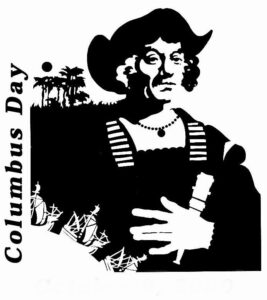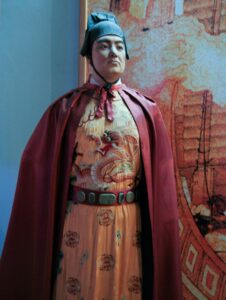
Drawing from the United States Department of Defense
In elementary school, most of us learned that Columbus, the renowned Italian explorer, discovered America. I remember listening in awe as my teacher explained the trials and adventures of Columbus. I also remember empathizing with him when he couldn’t find people to sponsor his trip to India before Ferdinand II and Isabella I of Spain finally agreed. Sadly, my image of him as a hero changed when I learned the story behind the myth. He was brutal to the native people in the Americas, enslaving them to search for gold. The rest is history.
Recently, a movement to make Columbus Day into Indigenous People’s Day has begun. States like Vermont and cities like Denver and Phoenix have instituted this change, though South Dakota has been celebrating Indigenous People’s Day since 1990. According to Dr. Leo Killsback of the Northern Cheyenne Nation and an assistant professor of American Indian Studies at Arizona State University, “Indigenous Peoples Day represents a shift in consciousness…It acknowledges that indigenous peoples and their voices are important in today’s conversations.”
The thinking behind this change is as follows: Columbus was not actually the first to “discover” America. He didn’t even land here, and he abused the locals tremendously. He and his men raped and murdered native people, along with enslaving them and enforcing Christianity upon them. Yet, many people (still) seem to have a misperception of Columbus (such as the members of the government of Oklahoma who recently overturned the request to make the holiday into Indigenous Peoples Day).
Dr. Killsback has argued that “we should question why we as Americans continue to celebrate [Columbus] without knowing the true history of his legacy, and why a holiday was created in the first place.” I completely agree with this sentiment, as do many others. Instead of Columbus Day, Hawaii has long celebrated Discoverer’s Day in honor of the Polynesian explorers who first colonized the island. Even people in Spain believe Columbus Day to be wrong. A group of council members in Barcelona urged the city to remove the 196-foot statue of Columbus in one of their busy intersections and make the holiday a regular working day. Though their proposal failed, the fact that they raised it at all suggests the growing awareness that Columbus should not be celebrated because of his crimes against native people of the Americas.
Aside from the fact that he was a cruel man, Columbus was also not the first European explorer to “discover” America, as we are taught in school. Amerigo Vespucci, Florentine navigator and explorer, (whom America is named after) and Leif Erikson, the great Viking leader, came to the continent long before Columbus. Zheng He, a Chinese Muslim (Hui) diplomat and admiral, is known to have come here much earlier than either of the two Italians. Though his trip isn’t as well documented, there is convincing evidence that it took place. A prominent Chinese lawyer and collector in 2006 found an old map which showed the world as a globe with all the major continents on it. The map was created in 1763 but had a note saying it was a copy of one made in 1418. This suggests that the Chinese had knowledge of the western hemisphere at least a century before Columbus and other European explorers ‘discovered’ America.

Statue of Zheng He in a museum in China
When I learned about all these other explorers, I was amazed. But learning about Zheng He was particularly interesting because not only was he Chinese, he was also Muslim. Both his ethnicity and his religion conflict with the Western tradition which holds that Europeans first ‘discovered’ America and that Muslims have only recently come here (see my article on A Brief History of Early Muslims in America). Zheng He’s father was a hajji, meaning that he had went on Hajj in Makkah (refer to article, A Test of Devotion and Sacrifice, for more information on Hajj). His family claimed that they were descended both from an early Mongol governor of Yunnan, a southwestern Chinese province, and from King Muhammad of Bukhara, in present day Uzbekistan. They also stated that their elders had fought in Genghis Khan’s army. Their family name, Ma, was the Chinese derivation of the name Muhammad (which I think is so cool!). Zheng He himself was originally known as Ma He and Ma Sanbao and received the name Zheng after he won a battle in Zhenglunba, a place near Beijing.
In 1381, Chinese forces of the Ming dynasty overthrew Yunnan, the last place in China that was still under the control of the Mongolians. At that time, Ma was about ten years old. He and others other boys were captured, castrated and sent to serve in the army as orderlies. Despite this, by 1390, he was able to distinguish himself as a junior officer skilled in war and diplomacy. He was elected as commander-in-chief and became one of the highest diplomatic agents under the Yongle emperor. Zheng He made a series of seven voyages up to places like India, Arabia, and Africa and helped grow Chinese maritime power. His journeys also increased Chinese emigration and colonization of Southeast Asia which lasted till the 19th century.
Zheng He was a phenomenal admiral and explorer. He made history in China with his great feats; however, his work was stopped around the late 1400s by the Chinese Ministry of War who confiscated all of Zheng He’s records, calling them “deceitful exaggerations of bizarre things far removed from the testimony of people’s eyes and ears” and his expeditions a waste of money. By this time, the Ming Dynasty had split up into many factions so there was a lot of internal conflict going on causing military attention to be spent more on Northern China. This in turn left the seas unmanned thus allowing pirates and smugglers a free-reign. Then, the emperor also called for the closing of borders and China once again became a closed state (one of the reasons why people in the West may not have heard of Zheng He). All of these events led to the culmination of Zheng He’s adventures on the sea but his legacy has echoed greatly ever since.
On an end note, Columbus may have caused ripples throughout the West when he ‘discovered’ the New World but that’s mainly because his trip was well-known and well-advertised whereas the other explorers didn’t receive that level of reception. Zheng He could have made an impact in America as well had the Chinese Ministry of War not disproved of the admiral’s travels and had the emperor not called for closed borders. History may have proceeded much differently if you think about it (quite scary and interesting to think about in fact!). Same with other explorers such as Vespucci and Erikson though I think the I think the latter would have influenced a much different environment compared to Columbus than Vespucci would have done. Vespucci and Columbus were both Italians and had similar understandings while Erikson was brought up in a completely different culture as a Viking. No matter what would have happened had these other explorers made an impact like Columbus, it still does not excuse our ignorance over Columbus’s actions. Simply said, he was a vile man and we as a society should not be supporting him. Instead, we should celebrate the Indigenous People who arrived here thousands of years ago, earlier than anyone else. It shouldn’t even be a topic of conflict as their claim over this right is so obvious. History owes it to them.
References
Columbus’ Bio: https://www.britannica.com/biography/Christopher-Columbus
Changing Columbus Day into Indigenous Peoples Day: http://www.cnn.com/2016/10/09/us/columbus-day-indigenous-peoples-day/
Amerigo Vespucci: http://www.biography.com/people/amerigo-vespucci-9517978
Chinese Map: http://www.nytimes.com/2006/01/17/world/who-discovered-america-zheng-who.html
Zheng He:



One thought on “Columbus, the First to Discover America?”
Comments are closed.